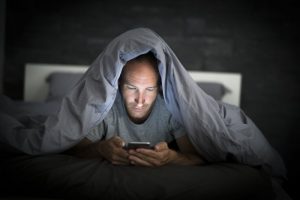 Do you spend time watching YouTube or playing games on your phone right before bed? With electronics playing such a constant part of our daily lives, it can be hard to pull yourself away. But too much screen time right before falling asleep may be affecting the quality of your rest more than you realize. Learn the sleep science behind how technology may be keeping you up.
Do you spend time watching YouTube or playing games on your phone right before bed? With electronics playing such a constant part of our daily lives, it can be hard to pull yourself away. But too much screen time right before falling asleep may be affecting the quality of your rest more than you realize. Learn the sleep science behind how technology may be keeping you up.
Blue Light from Electronic Screens Makes It Harder to Sleep
Your body uses a hormone called melatonin to control the sleep cycle. Melatonin production is based on exposure to light; when it gets dark at night, more of the hormone is made to begin preparing the body for sleep. However, artificial light can confuse the rhythms of production so that your body isn’t sure when it’s time to fall asleep.
Electronics such as phones, tablets, computers and television screens produce blue light, which can boost the body’s attention and reaction times. It suppresses melatonin production more than any other type of light, which makes it much harder to fall asleep. This is why it’s often best to give yourself 30 minutes of no screen time before going to bed.
Electronics Keep Your Brain Awake
When your brain is engaged in a mental task, it believes it needs to stay awake. Watching a movie or typing something on the computer might seem like good ways to unwind, but it makes it harder for the brain to get ready for sleep. Plus, stimulation such as watching a particularly exciting video can also make it harder for the body to relax. Drinking some warm milk or taking some deep breaths might be better ways to calm down before bed.
Electronics Wake You Up
The sound from electronic devices can easily disrupt your sleep. Your phone, for example, might disturb you with late-night texts, calls, emails, or calendar reminders. A laptop in your room might cause similar issues. For this reason, turn off all electronic devices before bed. If the temptation is too strong, it may be best to remove them from the room altogether.
If you think your gizmos are making it harder for you to get some shut-eye, it may be a good idea to speak with your sleep dentist about any habits you can change. Remember that the convenience of modern technology is a wonderful thing, but it’s not worth your health; make sure you power down early enough to ensure a good rest!
About the Author
Dr. Keane Fedosky specializes in offering comprehensive treatment for sleep apnea (where breathing continuously stops and starts) and snoring. He has over 20 years of experience in customized oral appliances and strives to give his patients the best quality care possible. To make an appointment at his practice, Sleep Rehab, visit his website or call (972) 753-3737.
